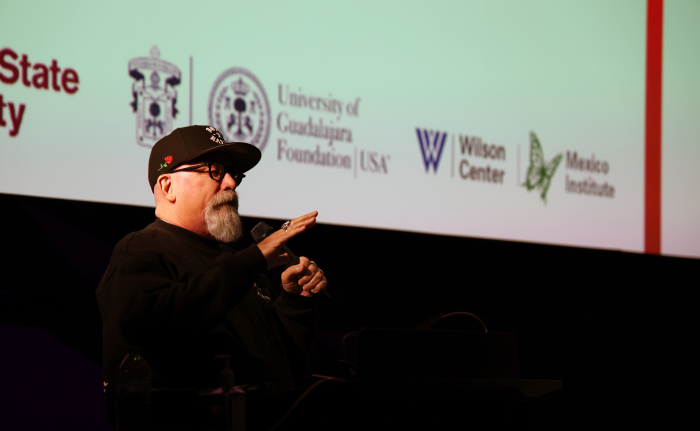Kaleidoscope short film contest inspires powerful binational filmmaking in its second year

Edgar Aquino Huerta (center) poses with his first-place award from the U.S.-Mexico Kaleidoscope, a binational short film contest and festival organized jointly by ASU, the Universidad de Guadalajara and the Mexico Institute at the Wilson Center, in Washington, D.C. Courtesy photo
“We come to this country not to steal anybody’s jobs but to take advantage of the opportunities that the rest ignore. We’ve been taking care of the American soil for many years. But our hands will always be invisible.”
The stirring final words of the Edgar Aquino Huerta narrative film “Made in America” closed out a second inspiring year of the U.S.-Mexico Kaleidoscope, a binational short film contest and festival, at its final screening of 2024 at The Sidney Poitier New American Film School’s student showcase event on Dec. 14. Organized jointly by ASU, the Universidad de Guadalajara and the Mexico Institute at the Wilson Center, Kaleidoscope seeks to encourage and curate new narratives about the relationship between the United States and Mexico, and our two societies.
Huerta’s moving film, about undocumented workers helping each other escape an immigration raid at their job in the U.S., highlights the precarity of DACA (Deferred Action for Childhood Arrivals) “dreamers.” Huerta’s win came with a $5,000 prize, while second place and a $2,500 prize went to “Proposition Amanecer” by the Amanecer People’s Project, a short documentary film about the history of the El Paso climate charter (Prop K). Third place and a $1,000 prize went to “Made It in America” by Melissa Ramirez, which tells the story of Oscar Ornelas, a Mexican immigrant who started the first Mexican carniceria in Colorado Springs, Colorado.
Over 1,000 films relating to the theme of “community” were submitted for consideration, an increase over the Kaleidoscope’s inaugural year of roughly 800 submissions. Winners were chosen by a panel of nine judges, including former U.S. Ambassador to Mexico Roberta Jacobson and Academy Award-winning art director and production designer Eugenio Caballero.
“I really like the fact that there is this series of very personal stories, where different realities are reflected, which would be difficult to reach,” Caballero said.
The winning films were screened at five different events over the fall, starting with a kickoff event at the Wilson Center in Washington, D.C., on Oct. 16. The films were also screened in LA at the GuadaLAjara Film Festival; in Guadalajara, in conjunction with the Guadalajara International Book Fair, the second largest in the world; in Mexico City at the Cineteca Nacional, a key institution dedicated to the preservation, classification, exhibition and dissemination of Mexican cinema; and in downtown Mesa, Arizona, at ASU’s Media and Immersive Experience (MIX) Center as part of The Poitier Film School’s fall student showcase.
The Poitier Film School’s Emmy Award-winning deputy director Peter Murrieta, who was named one of 2024’s Influential Latinos in Media by the Imagen Foundation, introduced the winning films at their final screening, encouraging film students and the graduating class to submit their work to Kaleidoscope in the years ahead.
“Film festivals are a great strategic opportunity to get your work in front of an audience, gain industry recognition and even win some money to fund your next project,” Murrieta told the crowd. “My hope is that these films will inspire you to think about the next step in your filmmaking journey and encourage you to submit your work to Kaleidoscope in the coming years.”
Kaleidoscope was originally launched as a one-time short film contest and festival to commemorate the 200th anniversary of diplomatic relations between the United States and Mexico. Due to enthusiastic response, Kaleidoscope is now an annual competition. Submissions for Kaleidoscope’s third year will open in early 2025.
"The most valuable thing about Kaleidoscope is that it is a truly binational initiative, bringing together a university in each country and a think tank in Washington dedicated to the study of Mexico,” said Isabel Migoya-Iriso, managing editor of Kaleidoscope. “I believe that the best way to strengthen the bilateral relationship between the United States and Mexico is to highlight these everyday stories that demonstrate that there are way more reasons to be united than to be separated."
More Arts, humanities and education

ASU English department inaugurates student research initiatives
The Department of English at Arizona State University has launched a cluster of initiatives aimed at bolstering student research and professional experiences.First, English’s internship and career…

Hidden histories: Who is Claudette Colvin?
History remembers the bold.Alexander the Great, Marie Curie and Neil Armstrong are all remembered for their audacity, discoveries and exploration. But sometimes, a figure slips through the cracks.…
Autism diagnosis leads ASU professor to write book about neurodiversity and literature
Bradley Irish always knew his mind worked differently.But it wasn’t until two years ago that Irish, an associate professor in Arizona State University’s Department of English, discovered why.He was…
